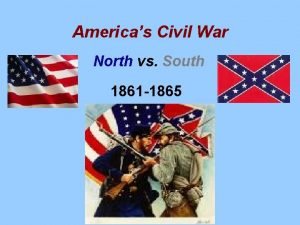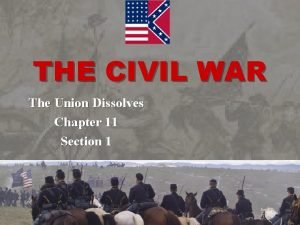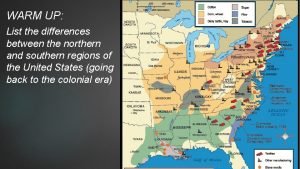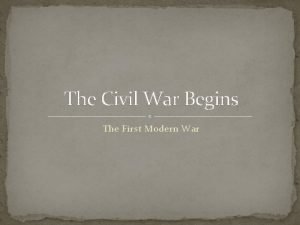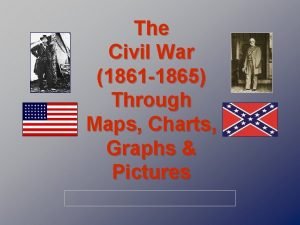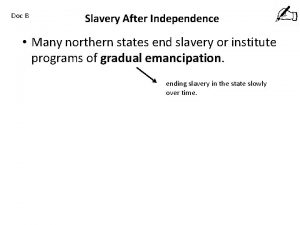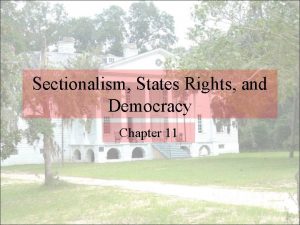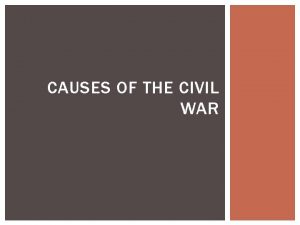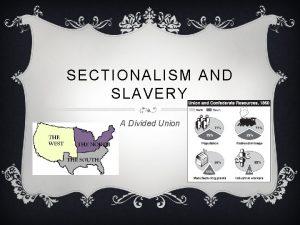THE AMERICAN CIVIL WAR SECTIONALISM SLAVERY STATES RIGHTS








- Slides: 8

THE AMERICAN CIVIL WAR SECTIONALISM, SLAVERY, STATES' RIGHTS & BALANCE OF POWER IN THE SENATE

THE AMERICAN CIVIL WAR TIMELINE 600, 000 fatalities later, the Confederates surrendered Slavery ended officially w/the Ramification of the 13 th Amendment then assasination of Lincoln Abraham Lincoln elected 16 th President (Nov) 1860 1861 Lincoln responds to the Confederate Army attack by declaring war 1865

4 MAIN CAUSES OF THE AMERICAN CIVIL WAR OBJECTIVE – I CAN EXPLAIN THE CAUSES, COURSE AND CONSEQUENCE OF THE CIVIL WAR • • Economy Slavery Sectionalism States' Rights

BALANCE OF POWER IN THE SENATE Between 1820 and 1850, the Senate was the focal point of the growing sectional crisis. In the Senate, where the Constitution established an equality of states, there was a delicate balance between North and South, slave a free states, and senators skillfully crafted legislation designed to resolved sectional conflicts and avoid secession and civil war. They failed.

SECTIONALISM – NATION DIVIDED BY INTERESTS, ATTITUDES & OVERALL LIFESTYLES North - Economy South - Economy Focused on fast-paced business and Relied on slow and steady agricultural growth industry, spending their days manufacturing, shipping, and trading goods. Sectionalism served Abraham Lincoln well in the presidential election of 1860 – opposed slavery Considered themselves Northerners (rarely discussed identifying themselves as Americans) Planting and picking crops was the work of slaves who supported plantation owners with their labor As a result of Abraham Lincoln's victory – 11 southern states decided to secede from the union to form the Confederate States of America Considered themselves Southerners

SLAVERY – THE BIG ISSUE BETWEEN THE NORTH AND THE SOUTH North South Slavery/Farming not important to the north Chattel Slavery – own the person totally and Developed a culture of Abolitionist – slavery was evil, one of the leaders was a free black man – Frederick Douglas forever then their children are automatically enslaved, brutal for African Americans, they were considered property, so they were brought and sold, not human Dependent on slavery to continue cheap production of cotton

STATES' RIGHTS (WHO HAS MORE POWER) North South Central government should have the final call on States more important than the federal government all decisions The Union – we must be united under Abe Lincoln, and the states don have the right to leave It's called the United States so we can decide to follow the laws or not Didn’t want the north passing laws to end slavery South Carolina nullified (ignored) a tax law on cotton Seceded (leave) the US and formed the Confederacy

FOUR VOLUNTEERS NEEDED TO CLOSE OUT TOMORROW'S LESSON What political compromises were made because of slavery? To what extent was slavery a “cause” of the Civil War? How did life change during the Civil War? What is the 13 th Amendment?


